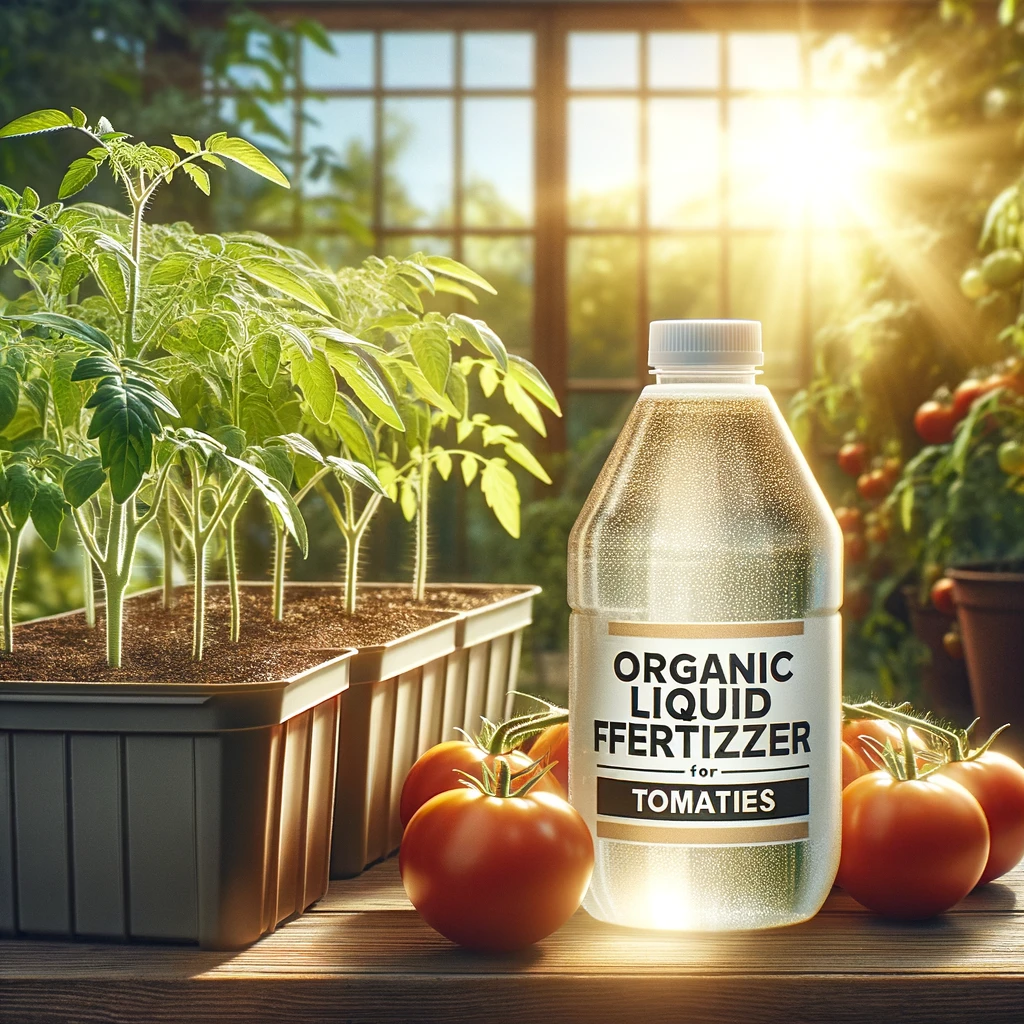Introduction to Organic Liquid Fertilizers for Tomatoes
Organic liquid fertilizers are playing an increasingly important role in maximizing the growth of tomato plants and giving them their best taste. Organic liquid fertilizers made from natural sources are more readily absorbed by the plants to assist their growth.
Organic liquid fertilizers for tomatoes are beneficial because they provide a balanced supply of the nutrients tomatoes need in forms that plants can readily use. Tomatoes need a balanced supply of nutrients in order to grow up to their full, flavourful potential. Those nutrients are nitrogen (N), phosphorus (P) and potassium (K), which are essential for tomato plants. N encourages growth of leaf and stem, P facilitates development of roots and fruits, and K is needed for robust plant health and functioning overall.
The use of correct organic liquid fertilizer for tomatoes plays a vital role in deciding the plants’ health, yield and tomatoes’ taste. Helen Fisher, a prominent expert in agriculture sector has underlined the value of the selection based on the nutritional requirements of tomatoes: ‘Choosing the proper type of organic liquid fertilizer for tomatoes can give the substantial differences in your tomatoes harvests by promoting plants’ growth not only but by increasing the quality of soils and preserving the envoirontment.’
This introduction gives the reader a taste of what’s ahead and acts as a lead-in to a discussion of various types of organic liquid fertilizer for tomatoes, putting readers in a better position to make appropriate information choices in terms of what sorts of fertilizers to purchase.
Types of Organic Liquid Fertilizers Suitable for Tomatoes
Organic liquid fertilizers are essential for cultivating tomatoes, not only to ensure their health but also to enhance their flavor. Various types of organic liquid fertilizers cater to specific needs and offer distinct benefits to tomato plants:
- Fish Emulsion: This fertilizer is highly valued for its high nitrogen content, ideal for fostering substantial, leafy plant growth. It is a quick-acting solution that provides nutrients directly available to the plants.
- Seaweed Extract: Known for its broad spectrum of micronutrients, seaweed extract contains many trace elements absent in other fertilizers but crucial for plant health. It also boosts a plant’s immune system, enhancing tomato resistance to pests and diseases.
- Organic Compost Tea: This gentle, all-purpose fertilizer enriches the soil with a wide range of beneficial microorganisms. It improves soil structure and increases its ability to retain water and nutrients, which is particularly beneficial for tomatoes in warm climates.
Each type of organic liquid fertilizer influences tomato health and productivity in its own way:
- Fish Emulsion supports rapid vegetative growth, helping develop a robust framework for the plant early in the season.
- Seaweed Extract not only improves the flavor and quality of the fruit but also ensures balanced growth through its comprehensive micronutrient profile.
- The enhancements to soil health from Organic Compost Tea boost overall plant vitality, increasing the likelihood of a healthy and abundant harvest.
Furthermore, the impact on the taste and quality of tomatoes is significant. Studies suggest that organic fertilizers tend to yield more flavorful tomatoes, likely because they enhance plant health and provide a more natural balance of nutrients, which influences the development of sugars and acids crucial for tomato taste.
Understanding the specific benefits and optimal applications of each type of organic liquid fertilizer can help gardeners fine-tune their fertilization strategies, ensuring that their tomato plants receive precisely what they need to thrive.

How to Choose the Best Organic Liquid Fertilizer for Tomatoes
Selecting the right organic liquid fertilizer for tomatoes is crucial for ensuring that your plants receive the necessary nutrients for optimal growth and flavorful fruits. This section will guide you through the key factors to consider when choosing the best organic liquid fertilizer for tomatoes.
- NPK Ratio: Tomatoes require a balanced intake of nitrogen (N), phosphorus (P), and potassium (K). Each of these nutrients plays a vital role in plant development:
- Nitrogen is crucial for fostering healthy leaf and stem growth.
- Phosphorus supports strong root development and is essential for producing tasty, healthy fruits.
- Potassium enhances overall plant health and increases disease resistance.
- Supplementary Micronutrients: Beyond the primary nutrients, tomatoes also need micronutrients such as calcium, magnesium, and sulfur to enhance fruit quality and structural integrity, thus boosting crop value and disease resistance. Make sure the organic liquid fertilizer includes these important micronutrients.
- Soil pH Match: The effectiveness of a fertilizer significantly depends on the soil’s pH. Tomatoes thrive in slightly acidic to neutral soil (pH 6.0-7.0). It’s important to choose a fertilizer that complements your garden’s soil pH to enhance nutrient uptake.
- Product Reviews and Recommendations: Research reviews and feedback for fertilizers formulated specifically for tomatoes. This real-world input can help you gauge which products have been effective in producing larger, tastier tomatoes.
- Transparency and Certification: Look for products with clear labeling that lists all ingredients and their proportions. Certifications from recognized organic bodies, such as the Organic Materials Review Institute (OMRI), indicate compliance with organic standards and are a hallmark of quality.
Dr. Lucy Reynolds, a plant and environmental expert, advises, “Select a fertilizer that aligns with circular agriculture principles, beneficial to both plants and the planet—an organic fertilizer from a natural source that is untreated chemically is generally the best approach.”
Armed with this information, you can make an informed decision to select the most suitable organic liquid fertilizer for tomatoes, ensuring your tomato plants are well-nourished for healthy growth and delicious fruits.
Application Tips for Organic Liquid Fertilizers on Tomato Plants
Organic liquid fertilizer can significantly boost the growth and productivity of tomato plants when applied correctly. Here are essential tips for effective application:
- Dilution and Application: Always dilute organic liquid fertilizer according to the manufacturer’s specified ratio to prevent damage to plant tissues. It is best to apply the diluted fertilizer directly to the soil around the roots rather than on the foliage, as direct sunlight on the leaves can cause burn. For foliar applications, applying the fertilizer during early morning or late evening optimizes nutrient absorption due to cooler temperatures, which reduce the rate of evaporation from the leaf surface.
- During Seedling Stage: Introduce nutrients gently to young plants using a milder solution, which helps avoid overwhelming the delicate seedlings.
- Vegetative Growth Phase: As the plant develops a larger leaf area, it can tolerate slightly higher concentrations of fertilizer, supporting vigorous and lush growth.
- Flowering and Fruiting Stage: Opt for a phosphorus-rich fertilizer formula to encourage robust flower and fruit development, critical for a successful harvest.
- Common Mistakes to Avoid:
- Over-fertilization: Excessive application can lead to nutrient runoff, environmental pollution, and potential harm to the plants. Adhere strictly to recommended dosages.
- Poor Timing: Avoid applying fertilizer during peak daytime temperatures to minimize evaporation and maximize absorption.
Following these guidelines ensures that your tomatoes receive the right amount of nutrients throughout their growth cycle, promoting healthy development and excellent flavor.

Case Studies and Testimonials
Exploring case studies and testimonials provides valuable insights into the effectiveness of organic liquid fertilizers for tomato cultivation. Here’s how real-world applications demonstrate their impact:
- Case Studies: Research has consistently shown that organic liquid fertilizers significantly enhance both the yield and quality of tomato crops. A notable study conducted at an agricultural university found that tomatoes fertilized with seaweed extract not only produced a higher yield but also tasted better due to the rich content of micronutrients and growth hormones. This highlights the effectiveness of using organic options over conventional fertilizers.
- Gardeners’ Testimonies: Many experienced gardeners share their success stories in online forums and gardening groups. For instance, a gardener from California reported significant improvements after switching to a fish emulsion-based organic liquid fertilizer. Her tomato plants became healthier, and the fruits were juicier and more flavorful, showcasing the practical benefits of organic fertilizers.
- Agronomists’ Insights: Expert agronomists endorse the use of organic liquid fertilizers, emphasizing their benefits beyond plant nutrition. They note that such fertilizers enhance soil health, making agricultural practices more sustainable by reducing chemical runoff and improving the soil’s natural fertility.
These real-world examples and expert opinions underline the advantages of selecting and properly applying the right organic liquid fertilizer. They demonstrate that such practices not only yield better crops but also contribute to more sustainable and environmentally friendly farming methods.
Conclusion
In conclusion, organic liquid fertilizer is important for tomato harvest, as it can increase the growth, health, and flavour of tomatoes. The benefits of these fertilizers are various; not only are they in a form that is easily absorbed by tomato plants, but they also improve the health of the soil and overall create a more sustainable environment.
All these case studies and testimonials have shown that the organic liquid fertilizer reaps tomatoes that are tastier and more abundant, with excellent quality control from seedling to plant to fruit. Gardeners and farmers are encouraged to assess their priorities in using household solutions to fertilise their gardens and farms for better yields now and the continual health of their soil and ecosystem later.
Given the wide range of organic liquid fertilizers on the market, those who wish to use them need to carefully choose a range that suits their soil types and the type of tomatoes they grow. Gardening, like the other arts, is not something you just pick up once and will be good at forever. It’s a continuous process of learning and adapting new methods and products in order to maximise your tomato output.
Using liquid organics for fertilisation will lead to healthier tomatoes in the end, and is a small step down a green path of more sustainable and responsible gardening and farming.
References about best organic liquid fertilizer for tomatoes:
- Enhancing Organic Tomato Yield and Quality by Liquid Organic Fertilizer – This study investigates the effects of various organic liquid fertilizers on the yield and quality of tomatoes. The research suggests that seaweed extracts, when used as part of an organic liquid fertilizer blend, can significantly increase both the yield and taste of tomatoes by providing rich micronutrients and growth hormones.
- The New Composition of Liquid Organic Fertilizer for Improving Organic Tomatoes – This research outlines the development of a new formula for organic liquid fertilizer that aims to enhance the growth and quality of organic tomatoes. The study highlights the increasing area under organic farming and the need for specialized fertilizers that cater to organic crops.
- NOVEL Organic Liquid Nutrients: An Effectual Tool for Organic Farming – This document details a study on the effectiveness of novel organic liquid nutrients on tomato growth and yield. The study found that combinations of organic manure and specific liquid organic fertilizers can improve yield by up to 83% and increase the vitamin C content by 66% compared to control groups.
- Effects of Liquid Organic Fertilizers and Boron Application on Tomato Growth – This research from Thailand investigates the use of liquid organic fertilizers, including Fish Amino Acid (FAA) and Shrimp Extract (SE), on tomato plants. The study shows promising results in the use of these fertilizers for enhancing the growth and yield of tomatoes.







